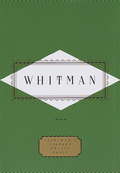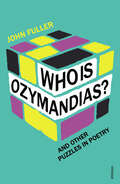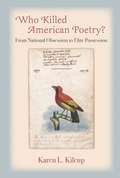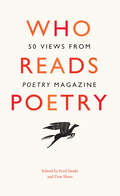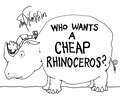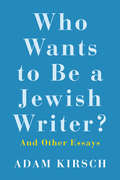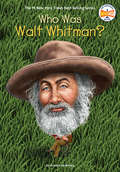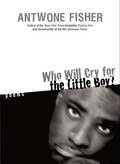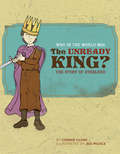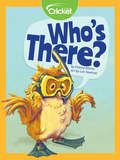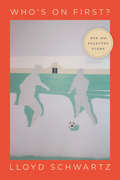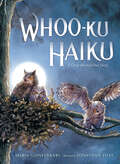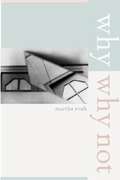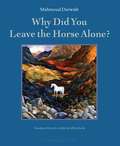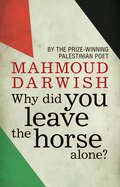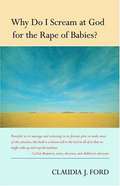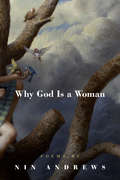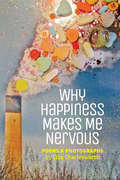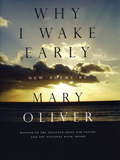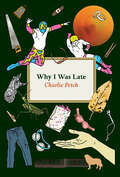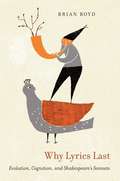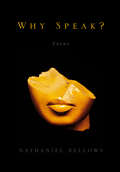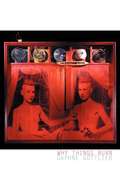- Table View
- List View
Whitman: Poems
by Walt WhitmanThe Everyman's Library Pocket Poets hardcover series is popular for its compact size and reasonable price which does not compromise content. Poems: Whitman contains forty-two of the American master's poems, including "Crossing Brooklyn Ferry," "Song of Myself," "I Hear America Singing," "Halcyon Days," and an index of first lines.
Who Is Ozymandias?: And other Puzzles in Poetry
by John FullerPart of the pleasure of poetry is unravelling the mysteries and difficulties it contains and solving the puzzles that lie within. Who, for instance, is Ozymandias? What is the Snark? Who is the Emperor of Ice-Cream? Or indeed, who is 'you' in a poem? In this perceptive and playful new book, acclaimed poet John Fuller looks at some of our greatest poems and considers the number of individual puzzles at their heart, casting light on how we should approach these conundrums as readers. From riddling to double entendres, mysterious titles to red herrings, Fuller unpicks the puzzles in works that range from Browning to Bishop, Empson to Eliot, Shelley to Stevens, to help us reach the rewards and revelations that lie at the centre of some of our best-loved poems.
Who Killed American Poetry?: From National Obsession to Elite Possession
by Karen L. KilcupThroughout the 19th century, American poetry was a profoundly populist literary form. It circulated in New England magazines and Southern newspapers; it was read aloud in taverns, homes, and schools across the country. Antebellum reviewers envisioned poetry as the touchstone democratic genre, and their Civil War–era counterparts celebrated its motivating power, singing poems on battlefields. Following the war, however, as criticism grew more professionalized and American literature emerged as an academic subject, reviewers increasingly elevated difficult, dispassionate writing and elite readers over their supposedly common counterparts, thereby separating “authentic” poetry for intellectuals from “popular” poetry for everyone else.\ Conceptually and methodologically unique among studies of 19th-century American poetry, Who Killed American Poetry? not only charts changing attitudes toward American poetry, but also applies these ideas to the work of representative individual poets. Closely analyzing hundreds of reviews and critical essays, Karen L. Kilcup tracks the century’s developing aesthetic standards and highlights the different criteria reviewers used to assess poetry based on poets’ class, gender, ethnicity, and location. She shows that, as early as the 1820s, critics began to marginalize some kinds of emotional American poetry, a shift many scholars have attributed primarily to the late-century emergence of affectively restrained modernist ideals. Mapping this literary critical history enables us to more readily apprehend poetry’s status in American culture—both in the past and present—and encourages us to scrutinize the standards of academic criticism that underwrite contemporary aesthetics and continue to constrain poetry’s appeal. Who American Killed Poetry? enlarges our understanding of American culture over the past two hundred years and will interest scholars in literary studies, historical poetics, American studies, gender studies, canon criticism, genre studies, the history of criticism, and affect studies. It will also appeal to poetry readers and those who enjoy reading about American cultural history.
Who Killed Cock Robin?
by Etienne DelessertAn illustrated version of the English ballad relating the murder and funeral of Cock Robin.
Who Reads Poetry: 50 Views from “Poetry” Magazine
by Don Share Fred SasakiWho reads poetry? We know that poets do, but what about the rest of us? When and why do we turn to verse? Seeking the answer, Poetry magazine since 2005 has published a column called “The View From Here,” which has invited readers “from outside the world of poetry” to describe what has drawn them to poetry. Over the years, the incredibly diverse set of contributors have included philosophers, journalists, musicians, and artists, as well as doctors and soldiers, an iron-worker, an anthropologist, and an economist. This collection brings together fifty compelling pieces, which are in turns surprising, provocative, touching, and funny. In one essay, musician Neko Case calls poetry “a delicate, pretty lady with a candy exoskeleton on the outside of her crepe-paper dress.” In another, anthropologist Helen Fisher turns to poetry while researching the effects of love on the brain, “As other anthropologists have studied fossils, arrowheads, or pot shards to understand human thought, I studied poetry. . . . I wasn’t disappointed: everywhere poets have described the emotional fallout produced by the brain’s eruptions.” Even film critic Roger Ebert memorized the poetry of e. e. cummings, and the rapper Rhymefest attests here to the self-actualizing power of poems: “Words can create worlds, and I’ve discovered that poetry can not only be read but also lived out. My life is a poem.” Music critic Alex Ross tells us that he keeps a paperback of The Palm at the End of the Mind by Wallace Stevens on his desk next to other, more utilitarian books like a German dictionary, a King James Bible, and a Macintosh troubleshooting manual. Who Reads Poetry offers a truly unique and broad selection of perspectives and reflections, proving that poetry can be read by everyone. No matter what you’re seeking, you can find it within the lines of a poem.
Who Wants a Cheap Rhinoceros?
by Shel SilversteinFrom New York Times bestselling author Shel Silverstein, acclaimed creator of Where the Sidewalk Ends, The Giving Tree, A Light in the Attic, and Falling Up, comes a boy’s tribute to a perfectly unexpected pet: a rhinoceros.In this cherished classic, published for the first time at HarperCollins, Silverstein delivers a hilarious look at the joys of having a rhinoceros as your friend, with his signature humor and black-and-white artwork.Generations have grown up with the works of Shel Silverstein, known not only as a poet and illustrator, but also for his work as a cartoonist, playwright, performer, recording artist, and Grammy Award-winning songwriter. With the timeless magic of his work, Shel Silverstein has encouraged children to dream and dare to imagine the impossible with his extraordinary poetry and unforgettable characters.Need a pet? What’s the best kind to get?A dog, a cat, a frog, a rat?How about a cheap rhinoceros?He’s funny and sweet and loyal as they come.He’s huggable and lovable.So who wants a cheap rhinoceros?Maybe you!
Who Wants to Be a Jewish Writer?: And Other Essays
by Adam KirschFrom one of today’s keenest critics comes a collection of essays on poetry, religion, and the connection between the two Adam Kirsch is one of today’s finest literary critics. This collection brings together his essays on poetry, religion, and the intersections between them, with a particular focus on Jewish literature. He explores the definition of Jewish literature, the relationship between poetry and politics, and the future of literary reputation in the age of the internet. Several essays look at the way Jewish writers such as Stefan Zweig and Isaac Deutscher, who coined the phrase “the non‑Jewish Jew,” have dealt with politics. Kirsch also examines questions of spirituality and morality in the writings of contemporary poets, including Christian Wiman, Kay Ryan, and Seamus Heaney. He closes by asking why so many American Jewish writers have resisted that category, inviting us to consider “Is there such a thing as Jewish literature?”
Who Was Walt Whitman? (Who Was?)
by Kirsten Anderson Who HQHow did a New York printer become one of the most influential poets of all time? Find out in this addition to the Who HQ library!Walt Whitman was a printer, journalist, editor, and schoolteacher. But today, he's recognized as one of America's founding poets, a man who changed American literature forever. Throughout his life, Walt journeyed everywhere, from New York to New Orleans, Washington D.C. to Denver, taking in all that America had to offer. With the Civil War approaching, he saw a nation deeply divided, but he also understood the power of words to inspire unity. So in 1855, Walt published a short collection of poems, Leaves of Grass, a book about the America he saw and believed in. Though hated and misunderstood by many at the time, Walt's writing introduced an entirely new writing style: one that broke forms, and celebrated the common man, human body, and the diversity of America. Generations later, readers can still find themselves in Whitman's words, and recognize the America he depicts. Who Was Walt Whitman? follows his remarkable journey from a young New York printer to one of America's most beloved literary figures.
Who Will Cry for the Little Boy?
by Antwone Q. FisherWith the publication of Finding Fish, his memoir of a childhood spent in foster homes in and around Cleveland, Antwone Fisher shared with the world his story of perseverance, determination, and courage. And he also showed that within him beat the heart of an artist -- a major factor in his resilience and recovery. Now with Who Will Cry for the Little Boy?, his first collection of poetry, Antwone Fisher reveals the inner truths that took him from a tumultuous childhood to the man he is today. The powerful poems presented here range from impressions and expressions of Antwone's years growing up to the love that he has gained from the family he made for himself as an adult. From the title poem -- which is featured prominently in the movie Antwone Fisher -- a plaintive, haunting tribute to a childhood lost to abuse and neglect, to "Azure Indigo," the uplifting and touching poem about his daughters, many readers will find their own feelings and experiences reflected in this lyrical and passionate collection.
Who in the World Was The Unready King?: The Story of Ethelred (Who in the World)
by Connie Clark Jed MickleDiscover the intriguing story of Ethelred the Unready in this junior-level biography from Peace Hill Press. Ethelred's mother stood behind him. The archbishop smeared holy oil on Ethelred's shoulders and hands. He gave Ethelred a heavy sword and placed a gold crown on his head. The crown was too big--it fell over his eyes, and Ethelred almost dropped the sword on the archbishop's foot. How did Ethelred become king when he was only ten years old? Outstanding illustrations from Jed Mickle complement the fabulous story, giving second-grade readers insight into the life of this influential figure. About the series: The classical curriculum introduces even the youngest student to the pleasures of true learning. Elementary students learn history not through predigested textbooks with multiple-choice answers, but through reading the stories of history. Unfortunately, biographies of great men and women of the past are almost all written for older students, limiting the ability of young students to explore history through reading. Libraries are crammed with biographies written for high school students and adults--while beginning readers are provided with a shelf full of junior-level books about football players, NASCAR drivers, and movie stars. Now, Peace Hill Press puts real history back into the grasp of the youngest historians with the Who in the World Biography Series. The first entries in the series provide young readers and their parents and teachers with biographies of great men and women of the Middle Ages. Designed to be used as part of The Story of the World curriculum, these biographies give beginning historians in grades 2-4 a chance to explore beyond the textbook. An audio version is also available separately.
Who's There?
by Dianne MoritzWhat else is there to do on a hot, summer day? Head to the flea’s pool, of course! In this funny rhyme, all the animals head to the pool to cool down.
Who's on First?: New and Selected Poems (Phoenix Poets)
by Lloyd SchwartzNew and selected poems by renowned poet Lloyd Schwartz. For more than four decades, readers and critics have found Lloyd Schwartz’s poems unlike anyone else’s—a rare combination of the heartbreaking and the hilarious. With his ear for the poetry of the vernacular, Schwartz offers us a memorable cast of characters—both real and imagined, foolish and oracular. Readers experience his mother’s piercing flashes of memory, the perverse comic wisdom of Gracie Allen, the uninhibited yet loving exhibitionists of antique pornography, and eager travelers crossing America in a club-car or waiting in a Brazilian airport. Schwartz listens to these people without judging—understanding that they are all trying to live their lives, whenever possible, with tenderness, humor, and grace.Who’s on First? brings together a selection of poems from all of Schwartz’s previous collections along with eagerly awaited new poems, highlighting his formal inventiveness in tangling and untangling the yarn of comedy and pathos. Underlying all of these poems is the question of what it takes and what it costs to make art.
Whoo-Ku Haiku: A Great Horned Owl Story
by Maria GianferrariStunning illustrations and gorgeous haikus lead young readers through the dramatic life cycle of one of America's most beloved wild animals.Pip. Pip. Pip. PokingA hole. Cracking. Cracking. OutPecks the white owlet.Watch as a pair of great horned owlets peep and squeak in their feathered nest. Mama and Papa hunt for food and fend off predators while the chicks grow strong enough to hop and flap between the branches of their tree, then leap and fly away, ready to explore the wild world around them.In this thrilling nonfiction picture book, a combination of haiku and dazzling illustration shows readers the fierce majesty of one of North America's most ubiquitous wild animals.
Why / Why Not
by Martha Clare RonkA book of short poems written in between--in between thoughts, questions, answers, conclusions. It is a stage play of a book, divided into four parts/acts and inspired by paintings, movies, Shakespeare, Chandler, and Los Angeles.
Why Did You Leave the Horse Alone?
by Mahmoud Darwish Jeffrey SacksAt once an intimate autobiography and a collective memory of the Palestinian people, Darwish's intertwined poems are collective cries, songs, and glimpses of the human condition. Why Did You Leave the Horse Alone? is a poetry of myth and history, of exile and suspended time, of an identity bound to his displaced people and to the rich Arabic language. Darwish's poems - specific and symbolic, simple and profound - are historical glimpses, existential queries, chants of pain and injustice of a people separated from their land.
Why Did You Leave the Horse Alone?
by Mahmoud Darwish Mohammad ShaheenA stunning new translation of Mahmoud Darwish's intertwining poetic narrative, presenting a profound portrait of the Palestinian people, the human condition, and Darwish's own hopes and dreamsSince Mahmoud Darwish's death, his poetic writings continue to be read by an audience in awe. This is a collection of autobiographical poetry designed to give an insight into the wider human condition. Darwish explores the meaning of life, identity, and the impact of exile. Hailed as the most important Arab poet of the modern day, Darwish's voice has come to represent a generation and the Palestinian people in the midst of the tense political situation in the Middle East. While Darwish explored themes of lost Eden, exile, and life after death, he resisted classification as a spokesperson for the Palestinian cause, and refused to use his art for purely political ends. Darwish's was a nomadic existence, much of it spent in international exile, and these experiences lent his writing a cosmopolitan edge—they partake of a worldwide mythology.
Why Do I Scream at God for the Rape of Babies?
by Claudia J. FordAt the center of Why Do I Scream at God for the Rape of Babies? is the tragic story of a five-month-old South African baby named Vyanna who is left alone in a Johannesburg porn theater by her homeless mother and then gang-raped. The story's heart, however, is one of healing, courage and growing love that Vyanna's adoptive mother experiences from the moment she sees the little girl. Journal entries, letters to friends and South African courts, and memories weave together Ford's two-year chronicle of a most unusual—and rewarding—mother-daughter relationship.
Why God Is a Woman
by Nin AndrewsWhy God Is a Woman is a collection of poems written about a magical island where women rule and men are the second sex. It is also the story of a boy who, exiled from the island because he could not abide by its sexist laws, looks back with both nostalgia and bitterness and wonders: Why does God have to be a woman? Celebrated prose poet Nin Andrews creates a world both fantastic and familiar where all the myths, logic, and institutions support the dominance of women.Nin Andrews's books include The Book of Orgasms and Sleeping with Houdini.
Why Happiness Makes Me Nervous
by Liza CharlesworthIn words and pictures, Liza Charlesworth's new book, Why Happiness Makes Me Nervous, captures the poetic journey of a girl's complicated coming of age. Loneliness, divorce, loss, love, burgeoning sexuality, and those awkward, epic years between adolescent and adulthood are explored in the pairing of these riveting poems and vivid photographs.
Why I Wake Early
by Mary OliverThe forty-seven new works in this volume include poems on crickets, toads, trout lilies, black snakes, goldenrod, bears, greeting the morning, watching the deer, and, finally, lingering in happiness. Each poem is imbued with the extraordinary perceptions of a poet who considers the everyday in our lives and the natural world around us and finds a multitude of reasons to wake early.
Why I Was Late
by Charlie PetchWith kitchen-table candour and empathy, Charlie Petch's debut collection of poems offers witness to a decades-long trans/personal coming of age, finding heroes in unexpected places. Why I Was Late fuses text with performance, brings a transmasculine wisdom, humour, and experience to bear upon tailgates, spaceships, and wrestling rings. Fierce, tender, convention re-inventing—Petch works hard. And whether it's as a film union lighting technician, a hospital bed allocator, a Toronto hot dog vendor, or a performer/player of the musical saw, the work is survival. Heroes are found in unexpected places, elevated by both large and small gestures of kindness, accountability and acceptance. No subject—grief, disability, kink, sexuality, gender politics, violence—is off limits. A poet so good at drag they had everyone convinced that they were a woman for the first forty years of their life, Petch has somehow brought the stage and its attendant thrills into the book. Better late than. And better. "Charlie Petch's Why I Was Late is a poetic debut with the wisdom of a sage and the emotional range of an expert comedian. … Do yourself a favor and read this book. This is a master at work."—Kai Cheng Thom, author of I Hope We Choose Love: A Trans Girl's Notes from the End of the World
Why Lyrics Last
by Brian BoydIn Why Lyrics Last, the internationally acclaimed critic Brian Boyd turns an evolutionary lens on the subject of lyric verse. He finds that lyric making, though it presents no advantages for the species in terms of survival and reproduction, is âeoeuniversal across cultures because it fits constraints of the human mind. âe#157; An evolutionary perspectiveâe" especially when coupled with insights from aesthetics and literary historyâe"has much to tell us about both verse and the lyrical impulse. Boyd places the writing of lyrical verse within the human disposition âeoeto play with pattern,âe#157; and in an extended example he uncovers the many patterns to be found within Shakespeareâe(tm)s Sonnets. Shakespeareâe(tm)s bid for readership is unlike that of any sonneteer before him: he deliberately avoids all narrative, choosing to maximize the openness of the lyric and demonstrating the power that verse can have when liberated of story. In eschewing narrative, Shakespeare plays freely with patterns of other kinds: words, images, sounds, structures; emotions and moods; argument and analogy; and natural rhythms, in daily, seasonal, and life cycles. In the originality of his stratagems, and in their sheer number and variety, both within and between sonnets, Shakespeare outdoes all competitors. A reading of the Sonnets informed by evolution is primed to attend to these complexities and better able to appreciate Shakespeareâe(tm)s remarkable gambit for immortal fame.
Why Speak?: Poems
by Nathaniel Bellows"A smart and powerful debut."--Library Journal A debut collection, exhibiting exceptional narrative and lyrical gifts, that explores the realms of memory, human emotion, and the natural world.These layered, braided narratives combine images of landscape and nature, childhood memories and family history, evoked paintings and performances. Nathaniel Bellows's verse is intimate yet inviting, dark but hopeful: "I could not saw the fallen tree--not all / of it had fallen--because somehow each spring, / the rotted half still mysteriously bloomed."
Why Things Burn: Poems
by Daphne GottliebFor many performance poets, the simple act of writing down the words can kill a poem's spirit and energy. Not so with Daphne Gottlieb. In Why Things Burn, Gottlieb tackles sexuality, lesbian issues, rape, urban life, and a host of other topics with the same power of her live performances.
Why You Should Laugh Three Times a Day
by Kimberling Galeti KennedyWhy You Should Laugh Three Times a Day always has a positive message included in each imaginative, inspiring and rhythmic story it tells. Furthermore, it is sure to be a joyful and entertaining read for you and every beloved child in your life.
